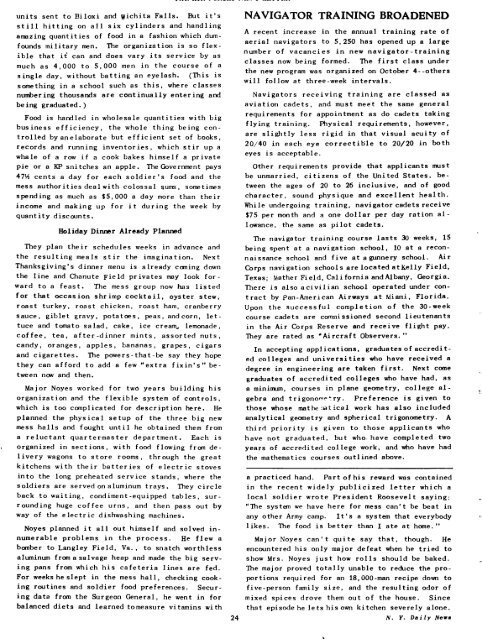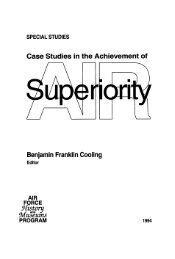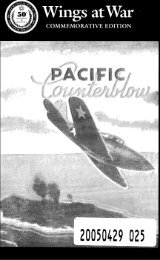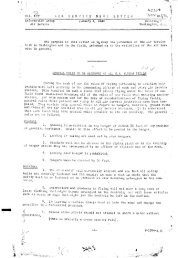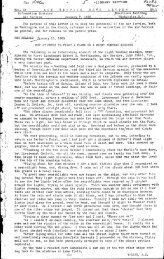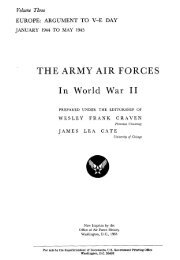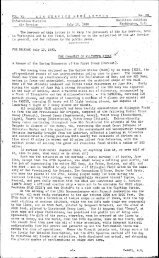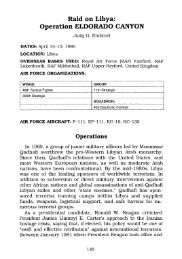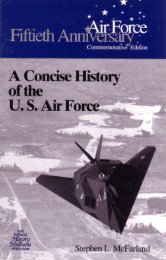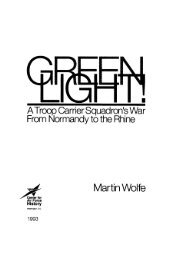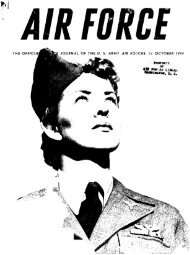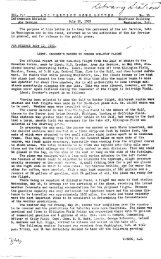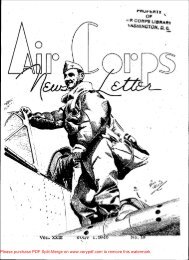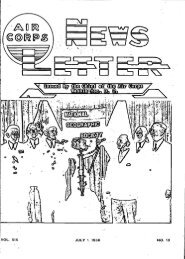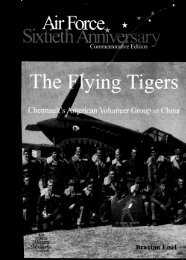News Letter 1941 Jul-Dec - Air Force Historical Studies Office
News Letter 1941 Jul-Dec - Air Force Historical Studies Office
News Letter 1941 Jul-Dec - Air Force Historical Studies Office
Create successful ePaper yourself
Turn your PDF publications into a flip-book with our unique Google optimized e-Paper software.
units sent to Biloxi and wichita Falls. But it's<br />
still hitting on all six cylinders and handling<br />
amazing quantities of food in a fashion which dumfounds<br />
military men. The organization is so flexible<br />
that it can and does vary its service by as<br />
much as 4,000 to 5,000 men in the course of a<br />
single day, without batting an eyelash. (This is<br />
something in a school such as this, where classes<br />
numbering thousands are continually entering and<br />
being graduated.)<br />
Food is handled in wholesale quantities with big<br />
business efficiency, the whole thing being controlled<br />
by an elaborate but effie ient set of books,<br />
records and running inventories, which stir up a<br />
whale of a row if a cook bakes himself a private<br />
pie or a KP sni tches an apple. The Gove rnment pays<br />
47~ cents a day for each soldier's food and the<br />
mess authoritiesdealwith colossal !lums, sometimes<br />
spending as much as $5,000 a day more than their<br />
income and making up for it during the week by<br />
quantity discounts.<br />
Holiday Dinner Already Planned<br />
They plan their schedules weeks in advance and<br />
the resulting meals stir the imagination. Next<br />
Thanksgiving's dinner menu is already coming down<br />
the line and Chanute Field privates may look forward<br />
to a feast. The mess group now has listed<br />
for that occasion shrimp cocktail, oyster stew.<br />
roast turkey, roast chicken, roast ham, cranberry<br />
sauce, giblet gravy, potatoes, peas, and corn, lettuce<br />
and tomato salad, cake, ice cream. lemonade,<br />
coffee, tea, after-dinner mints, assorted nuts,<br />
candy, oranges, apples, ban~nas, grapes, cigars<br />
and cigarettes. The powers-that-be say they hope<br />
they can afford to add a few "extra fixin's" between<br />
now and then.<br />
Major Noyes worked for two years building his<br />
organization and the flexible system of controls,<br />
which is too complicated for description here. He<br />
planned the physical setup of the three big new<br />
mess halls and fought until he obtained them from<br />
a reluctant quartermaster department. Each is<br />
organized in sections, with food flowing from delivery<br />
wagons to store rooms, through the great<br />
kitchens with their batteries of electric stoves<br />
into the long preheated service stands, where the<br />
soldiers are served on aluminum trays. They circle<br />
back to waiting, condiment-equipped tables, surrounding<br />
huge coffee urns, and then pass out by<br />
way of the electric dishwashing machines.<br />
Noyes planned it all out himself and solved innumerable<br />
problems in the process. He flew a<br />
bomber to Langley Field, Va., to snatch worthless<br />
alumim.un from a salvage heap and made the big serving<br />
pans from which his cafeteria lines are fed.<br />
For weeks he slept in the mess hall, checking cooking<br />
routines and soldier food preferences. Securing<br />
data from the Surgeon General, he went in for<br />
balanced diets and learned tomeasure vitamins with<br />
NA VIGA TOR TRAINING<br />
BROADENED<br />
A recent increase in the annual training rate of<br />
aerial navigators to 5,250 has opened up a large<br />
number of vacancies in new navigator-training<br />
classes now being formed. The first class under<br />
the new program was organized on October 4--others<br />
will follow at three-week intervals.<br />
Navigators receiving training are classed as<br />
aviation cadets, and must meet the same general<br />
requirements for appointment as do cadets taking<br />
flying training. Physical requirements, however,<br />
are slightly less rigid in that visual acuity of<br />
20/40 in each eye correctible to 20/20 in both<br />
eyes<br />
is acceptable.<br />
Other requirements provide that applicants must<br />
be unmarried, citizens of the United States, between<br />
the ages of 20 to 26 inciusive, and of good<br />
character, sound physique and excellent health.<br />
While undergoing training, navigator cadets receive<br />
$75 per month and a one dollar per day ration allowance,<br />
the same as pilot cadets.<br />
The navigator training course lasts 30 weeks, 15<br />
being spent at a navigation school, 10 at a reconnaissance<br />
school and five at a gunnery school. <strong>Air</strong><br />
Corps navigation schools are located atKelly Field,<br />
Texas; Mather Field, Cali fornia and Albany, Georgia.<br />
There is also acivilian school operated under contract<br />
by pan-American <strong>Air</strong>ways at Miami, Florida.<br />
Upon the successful completion of the 30-week<br />
course cadets are commissioned second lieutenants<br />
in the <strong>Air</strong> Corps Reserve and receive flight pay.<br />
They are rated as "<strong>Air</strong>craft Observers."<br />
In accepting applications, graduates of accredi t-<br />
ed colleges and universities who have received a<br />
degree in engineering are taken first. Next come<br />
graduates of accredited colleges who have had, as<br />
a minimum, courses in plane geometry, college algebra<br />
and trigonoM~.ry. Preference is given to<br />
those whose mathe;liltical work has also included<br />
analytical geometry and spherical trigonometry. A<br />
third priority is given to those applicants who<br />
have not graduated, but who. have completed two<br />
years of accredited college work, and who have had<br />
the mathematics courses outlined above.<br />
a practiced hand. Part of his reward was contained<br />
in the recent widely publicized letter which a<br />
local soldier wrote President Roosevelt saying:<br />
"The system we have here for mess can't be beat in<br />
any other Army camp. It's a system that everybody<br />
likes. The food is better than I ate at home."<br />
Major Noyes can't quite say that, though. He<br />
encountered his only major defeat when he tried to<br />
show Mrs. Noyes just how rolls should be baked.<br />
The major proved totally unable to reduce the proportions<br />
required for an 18,OOO-man recipe down to<br />
five-person family size, and the resulting odor of<br />
mixed spices drove them out of the house. Since<br />
that episode he lets his own ki tchen severely alone.<br />
24 N. Y. Daily New.


